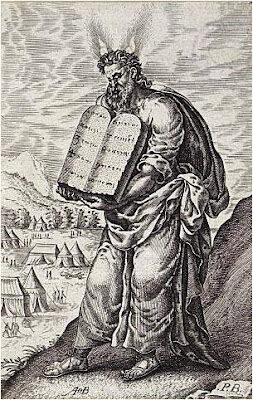It is true; Jews as individuals, never had to keep 613 commandments. Please do not make the mistake of asking a Jewish person if they keep the 613 commandments. But were there not 613 commandment for the Jews to keep? Yes however, some of the 613 were just for priests, some just for kings, some just for certain tribes, some just for men and others just for women.
A better question is “Do you keep the Ten Commandments? And when you do not, how do you atone for your sin?” The answer might be that atonement is made through prayer and good works. Judaism has, to a large extent, become a works based salvation religion.
Indeed, the Talmud-Sanhedrin 97b has Rabbi Rabh stating,
All the predestined dates for redemption (the coming of Messiah) have passed and the matter now depends only on the repentance and good deeds.1
However, the Bible states:
“The righteousness of the righteous man shall not deliver him in the day of his transgression; as for the wickedness of the wicked, he shall not fall because of it in the day he turns from his wickedness; nor shall the righteous be able to live because of his righteousness in the day that he sins.” When I say to the righteous that he shall surely live, but he trusts in his own righteousness and commits iniquity, none of his righteous works shall be remembered_ (Ezekiel 33:12).
Also,
All of us are like someone unclean, all our righteous deeds are like menstrual rags; we wither, all of us, like leaves; and our misdeeds blow us away like the wind (Isaiah 64:6).
 A common Jewish teaching is that the whole law can be, and has been, reduced to one single commandment which is living by faith. The Talmud-Makkot 24a states:
A common Jewish teaching is that the whole law can be, and has been, reduced to one single commandment which is living by faith. The Talmud-Makkot 24a states:
After Moses, David came and reduced the six hundred thirteen commandments to eleven, as it is written: “Lord, who shall sojourn in Your tabernacle? Who shall dwell on Your holy mountain? He who walks blamelessly, and does what is right, and speaks truth in his heart, who does not slander with his tongue, and does no evil to his friend, nor takes up a reproach against his neighbor, in whose eyes a reprobate is despised, but honors those who fear the Lord, who swears to his own hurt and does not change, who does not put out his money at interest, and does not take a bribe against the innocent” [Ps. 15:1-5].
Then Isaiah came and reduced the commandments to six, as it is written, “He who walks righteously and speaks uprightly, he who despises the gain of oppression, who shakes his hands lest he hold a bribe, who stops his ears from hearing of bloodshed, and shuts his eyes from looking upon evil” [Isa. 33:15]_
Then Micah came and reduced them to three, as it is written, “It has been told you, O man, what is good, and what the Lord requires of you: To do justice, to love mercy, and to walk humbly with your God” [Mic. 6:8]_
Then Isaiah came again and reduced to two. “Thus says the Lord: Keep justice and do righteousness” [Isa. 56:1].
Amos came and reduced them to one, as it is written, “Thus says the Lord to the house of Israel: Seek Me and live” [Amos 5:4]_
Habakkuk came and also reduced them to one, as it is written, “The righteous shall live by faith” [Hab. 2:4].
Keep in mind that this comes from the Talmud which orthodox Judaism considers as authoritative as the written Word of God: the Old Testament-the Tanakh.
The New Testament comes to the same conclusion:
I am not ashamed of the gospel, because it is the power of God for the salvation of everyone who believes: first for the Jew, then for the Gentile. For in the gospel a righteousness from God is revealed, a righteousness that is by faith from first to last, just as it is written: “The righteous will live by faith” (Romans 1:16-17).
Talmud-Shabbath 31a,
What is hateful to you, do not to your neighbour(1) that is the whole Torah, while the rest is the commentary thereof.
Footnote: (1) “The golden rule; cf. Lev. XIX, 18: but thou shalt love thy neighbour as thyself_“
Under the new covenant we are taught exactly the same thing:
Then one of them, a lawyer, asked Him a question, testing Him, and saying, “Teacher, which is the great commandment in the law?” Jesus said to him, “‘You shall love the LORD your God with all your heart, with all your soul, and with all your mind.’ This is the first and great commandment. And the second is like it: ‘You shall love your neighbor as yourself.’ On these two commandments hang all the Law and the Prophets” (Matthew 22:35-40).
See my essay Rabbi Aryeh Kaplan’s Anti-Missionary Assertions for an unfortunate example of how Christianity is criticized due to this text.
A likewise situation occurred:
Then one of the scribes came, and having heard them reasoning together, perceiving that He had answered them well, asked Him, “Which is the first commandment of all?” Jesus answered him, “The first of all the commandments is: ‘Hear, O Israel, the LORD our God, the Lord is one. And you shall love the Lord your God with all your heart, with all your soul, with all your mind, and with all your strength.’ This is the first commandment. And the second, like it, is this: ‘You shall love your neighbor as yourself.’ There is no other commandment greater than these.”
So the scribe said to Him, “Well said, Teacher. You have spoken the truth, for there is one God, and there is no other but He. And to love Him with all the heart, with all the understanding, with all the soul, and with all the strength, and to love one’s neighbor as oneself, is more than all the whole burnt offerings and sacrifices” (Mark 12:28-33).
Under the new covenant we are taught that we are not to let ourselves be judged according to the old covenant because we recognize that the old covenant rituals were symbolic of the Messiah and now that he has come those things have been fulfilled.
Don’t let anyone pass judgement on you in connection with eating and drinking, or in regard to holiday, or Rosh-Hodesh or Shabbat. These are a shadow of things that are coming, but the body is of the Messiah [or, but the substance belongs to the Messiah]” (Colossians 2:16-17).
Under the new covenant we are also taught not to use freedom from the old covenant as an excuse to live sinful lives,
For, brothers, you were called to be free (or, to liberty). Only do not let that freedom (or, liberty) become an excuse for allowing your old nature to have its way. Instead, serve one another in love (Galatians 5:13).
Under the new covenant we are not bound to keep the ritualistic aspects of the old covenant however, we are to keep the moral aspects. We keep the commandments that deal with morality and a proper reverence for God but do not necessarily keep the seventh day Sabbath (Friday sundown to Saturday sundown) as discussed above in the quote from Colossians 2:16-17, although we do keep a Sabbath day. Also, as quoted above, from the Jerusalem and Babylonian Talmud, both Jewish and Gentile Christians are keeping the major principle of the Torah. Yet, salvation is by grace and not by works: this, we must ponder.

